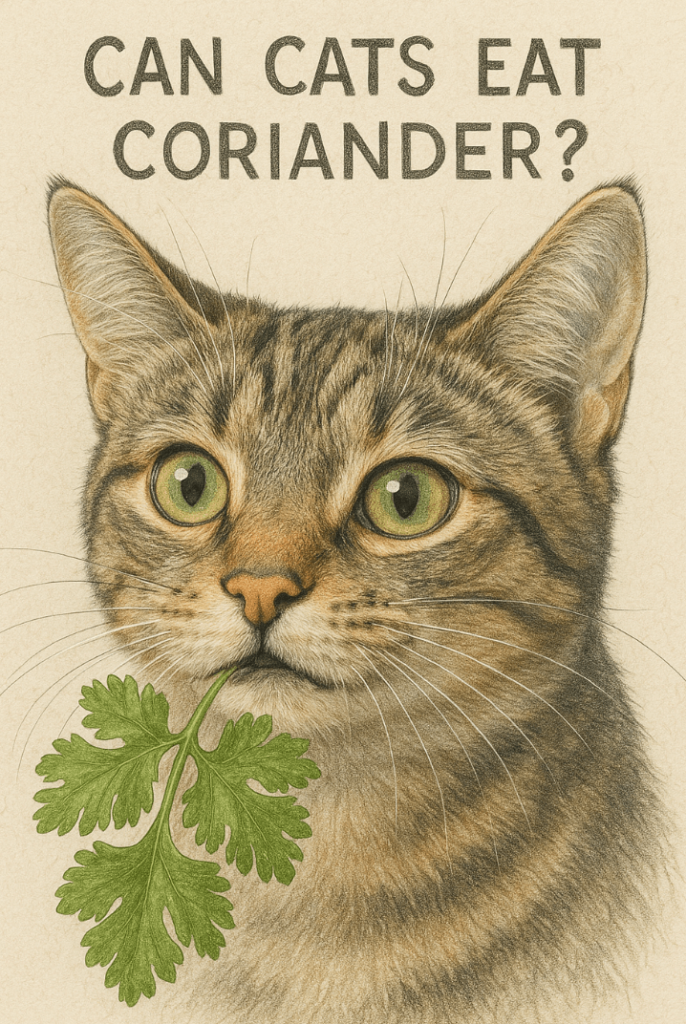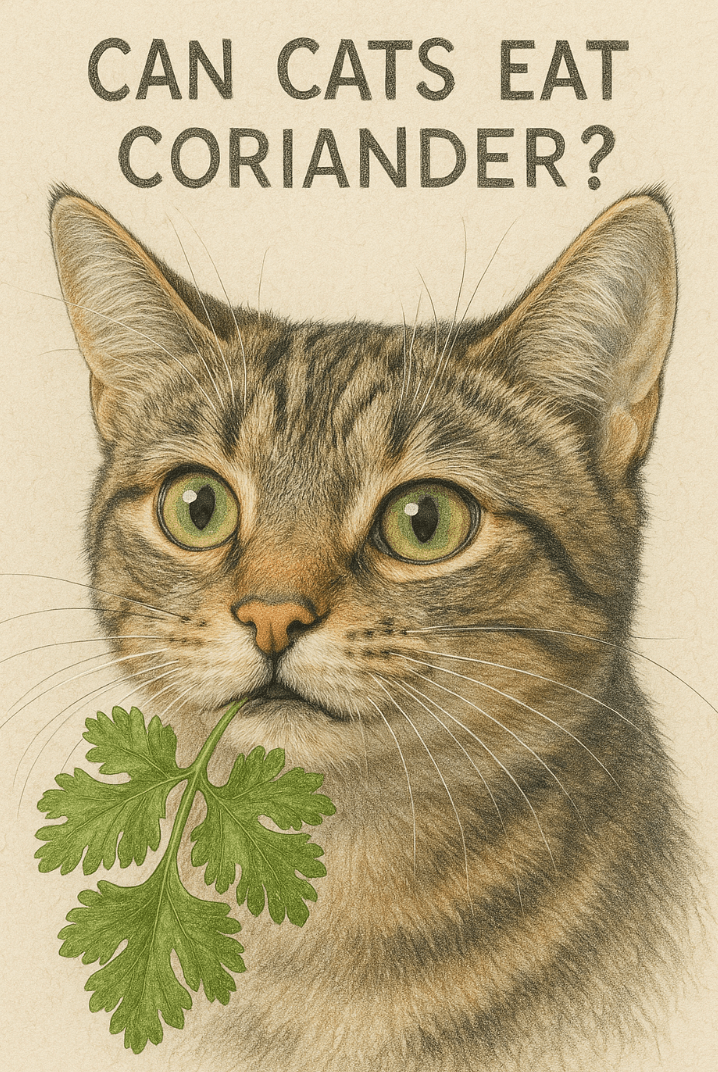Can Cats Eat Coriander?
When it comes to feeding our feline friends, many pet owners wonder whether herbs like coriander (also known as cilantro) are safe for cats. Coriander is a popular herb used in cooking and garnishing dishes, but its safety for cats isn’t always clear. While some human foods are perfectly fine for cats in moderation, others can pose risks if consumed incorrectly. Understanding whether coriander is safe for your cat—and how to introduce it into their diet—can help you make informed decisions about their nutrition. In this blog post, we’ll explore everything you need to know about cats and coriander, from potential benefits to possible risks, ensuring your furry friend stays healthy and happy.
Is Coriander Safe for Cats?
The good news is that coriander is generally considered safe for cats when given in small amounts. However, there are important considerations to keep in mind before offering this herb to your pet.
Non-Toxic Classification:
Coriander is not listed as toxic to cats by veterinary authorities, making it a safer option compared to other herbs or spices.Moderation Is Key:
While safe, excessive consumption of coriander can upset your cat’s stomach or lead to digestive issues like vomiting or diarrhea.Potential Allergic Reactions:
Some cats may have sensitivities or allergies to coriander, so it’s essential to monitor them closely after introduction.No Nutritional Necessity:
Cats are obligate carnivores, meaning they don’t require plant-based foods like coriander to meet their dietary needs.Avoid Seasoned or Processed Coriander:
Never give your cat coriander that has been mixed with salt, spices, or oils, as these additives can be harmful.
By understanding these factors, you can determine whether coriander is a suitable treat for your cat.
Potential Benefits of Coriander for Cats
While cats don’t rely on herbs for nutrition, coriander does offer some minor benefits that might appeal to curious pet owners. These advantages should be viewed as supplementary rather than essential.
Rich in Antioxidants:
Coriander contains antioxidants that may support overall health by combating free radicals in the body.Mild Digestive Aid:
In small amounts, coriander may help soothe mild digestive discomfort, though it’s no substitute for veterinary care.Encourages Hydration:
Fresh coriander leaves contain water, which can contribute to your cat’s daily fluid intake.Mental Stimulation:
Offering a small piece of coriander can provide sensory enrichment, satisfying your cat’s curiosity about new textures and flavors.Low-Calorie Treat Option:
For cats watching their weight, coriander is a low-calorie snack that won’t contribute to excess pounds.
While these benefits exist, they’re minimal compared to a balanced, meat-based diet tailored to your cat’s needs.
Check this guide 👉Can Cats Stress Eat? Best 7 Expert Tips!
Check this guide 👉Can Cats Eat Fennel? Best 7 Expert Tips!
Check this guide 👉Can Cats Eat Stevia? Best 7 Expert Tips!

Safe Ways to Offer Coriander to Cats | Risks of Feeding Coriander Incorrectly |
|---|---|
Small, fresh leaves as an occasional treat | Overfeeding leading to digestive upset |
Plain, unseasoned coriander only | Mixing with harmful additives like garlic |
Introducing gradually to test tolerance | Potential allergic reactions |
Using as a garnish for homemade cat food | Feeding spoiled or wilted leaves |
Monitoring for adverse reactions | Ignoring signs of discomfort or illness |
How to Safely Introduce Coriander to Your Cat
If you decide to offer coriander to your cat, it’s important to do so carefully to avoid any negative outcomes. Follow these steps to ensure a safe introduction.
Start with Tiny Amounts:
Begin by offering a single, small leaf to gauge your cat’s reaction and tolerance.Observe for Adverse Reactions:
Watch for signs of vomiting, diarrhea, or lethargy after consumption, and consult your vet if needed.Use Only Fresh Leaves:
Avoid dried or powdered coriander, as these forms may lose nutrients or irritate your cat’s digestive system.Keep It Plain:
Ensure the coriander is free from seasonings, oils, or other ingredients that could harm your cat.Don’t Force Consumption:
If your cat shows no interest in coriander, don’t force them to eat it—they instinctively know what’s best for their bodies.
By following these guidelines, you can safely explore whether your cat enjoys coriander without risking their health.
Signs Your Cat May Not Tolerate Coriander
Even though coriander is generally safe, some cats may not tolerate it well. Recognizing warning signs early allows you to act quickly and prevent complications.
Vomiting or Diarrhea:
These symptoms indicate that your cat’s digestive system is struggling to process the herb.Excessive Drooling:
Drooling can signal irritation in the mouth or throat caused by consuming coriander.Loss of Appetite:
If your cat refuses to eat after trying coriander, it could mean they’re experiencing discomfort.Pawing at the Mouth:
This behavior suggests irritation or an unpleasant taste that your cat wants to remove.Lethargy or Unusual Behavior:
A sudden change in energy levels may indicate a more serious reaction requiring veterinary attention.
Understanding these signs helps you respond promptly and prioritize your cat’s well-being.
Common Mistakes to Avoid When Feeding Coriander to Cats
Feeding coriander to your cat requires careful consideration to avoid mistakes that could harm their health. Here are some pitfalls to watch out for.
Offering Large Quantities:
Even safe foods can cause problems if given in excess; stick to tiny portions to avoid digestive issues.Using Seasoned or Cooked Coriander:
Added ingredients like salt, garlic, or oil can be toxic to cats; always use plain, fresh leaves.Ignoring Allergy Signs:
Failure to recognize allergic reactions can lead to prolonged discomfort or worsening symptoms.Forcing Uninterested Cats to Eat:
If your cat turns away from coriander, respect their instincts and don’t push them to consume it.Neglecting Veterinary Advice:
Skipping a professional opinion can result in unknowingly harming your cat with inappropriate treats.
Avoiding these mistakes ensures a safer experience for your cat.
Alternatives to Coriander for Curious Cats
If your cat doesn’t enjoy coriander—or if you’d prefer other options—there are plenty of cat-safe alternatives to explore.
Catnip:
A classic favorite, catnip stimulates playful behavior and relaxation in most cats.Parsley:
Rich in vitamins, parsley is another mild herb that cats may enjoy in small amounts.Basil:
This fragrant herb is non-toxic and adds variety to your cat’s palate.Thyme:
Known for its soothing properties, thyme can be offered sparingly as a treat.Fresh Grass or Cat-Safe Plants:
Growing cat grass indoors provides a natural, fibrous snack that aids digestion.
These alternatives allow you to cater to your cat’s curiosity while keeping them safe.
Understanding Your Cat’s Natural Diet Preferences
Cats are obligate carnivores, meaning their bodies are designed to thrive on animal-based proteins. Understanding their dietary preferences explains why herbs like coriander aren’t essential.
Meat-Centric Needs:
Cats require taurine, an amino acid found in meat, to maintain heart and eye health; plants can’t replace this nutrient.Limited Taste Buds:
Unlike humans, cats have fewer taste buds and lack receptors for sweetness, making them less inclined toward certain flavors.Instinctual Selectivity:
Cats naturally gravitate toward foods that meet their nutritional needs, ignoring items that don’t benefit them.Hydration Focus:
Wet food and water-rich snacks are more appealing to cats than dry herbs, supporting their hydration needs.Herbs as Optional Extras:
While herbs like coriander aren’t harmful, they’re considered extras rather than staples in a cat’s diet.
By respecting your cat’s natural inclinations, you can provide a diet that aligns with their biology and keeps them thriving.
Frequently Asked Questions About Cats and Coriander
Can kittens eat coriander?
Kittens have sensitive digestive systems, so it’s best to avoid giving them coriander until they’re older
What should I do if my cat eats too much coriander?
Monitor for symptoms of digestive upset, and contact your veterinarian if you notice anything unusual.
Are there alternatives to coriander for cats?
Yes, cat-safe herbs like parsley or catnip can serve as alternatives, though they’re also optional treats.
Can coriander cure bad breath in cats?
No, coriander won’t address underlying causes of bad breath; consult your vet for proper dental care.
How often can I give my cat coriander?
Limit coriander to rare occasions, as it offers no significant nutritional value for cats.
Prioritizing Your Cat’s Health When Introducing Coriander
Feeding coriander to your cat can be a fun and harmless experiment, provided it’s done responsibly. While this herb isn’t toxic and may offer minor benefits, it’s not a necessary part of a cat’s diet. Always prioritize your cat’s primary nutritional needs, which revolve around high-quality protein sources. By introducing coriander cautiously and monitoring your cat’s response, you can ensure their safety while exploring new flavors together. Remember, your feline companion relies on you to make the best choices for their health and happiness—so always err on the side of caution when trying something new.
Do Cats Have Taste Buds? Best 7 Expert Tips! – Discover how cats experience flavors and why their taste is so unique.
Do Dogs Have Taste Buds? Best 7 Expert Tips! – Discover how dogs experience taste, their preferences, and what it means for their diet and health.
Can Cats Taste Sweet? Best 7 Expert Tips! – Discover why cats can’t taste sweetness, how it affects their diet, and tips to keep them healthy and happy.
Can Dogs Taste Sweet? Best 7 Expert Tips! – Discover how dogs perceive sweetness, which foods are safe, and tips to manage their sweet cravings responsibly.





